Pam Lecky's Blog, page 17
March 26, 2021
New Release from Catherine Kullmann
I’m delighted to bring you news of a new release from my very good friend, Catherine Kullmann. If you love the Regency period, you will adore her books.
Catherine Kullmann was born and educated in Dublin. She has worked in the Irish and New Zealand public services and in the private sector. Following a three-year courtship conducted mostly by letter, she moved to Germany where she lived for twenty-five years before returning to Ireland. Widowed, she has three adult sons and two grandchildren.
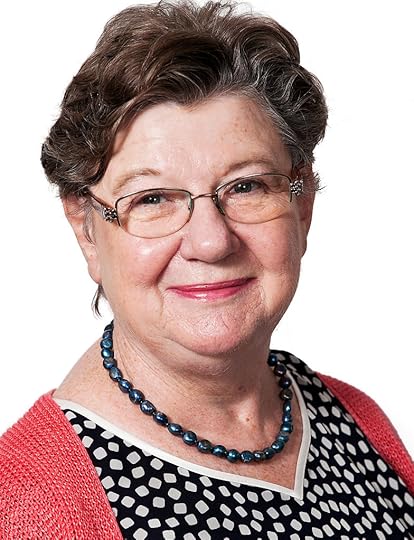
Catherine has always been interested in the extended Regency period, a time when the foundations of our modern world were laid. She loves writing and is particularly interested in what happens after the first happy end—how life goes on for the protagonists and sometimes catches up with them. Her books are set against a background of the offstage, Napoleonic wars and consider in particular the situation of women trapped in a patriarchal society. She is the author of The Murmur of Masks, Perception & Illusion, A Suggestion of Scandal, The Duke’s Regret, The Potential for Love, and A Comfortable Alliance
Catherine also blogs about historical facts and trivia related to this era. You can find out more about her books and read her blog (My Scrap Album) at www.catherinekullmann.com
Her Facebook page is https://www.facebook.com/catherinekullmannauthor
Pam, thank you so much for inviting me to talk about my new book, A Comfortable Alliance. It is another Regency novel and starts in 1821, six years after the battle of Waterloo.
In July 1815, Helena Swift helped nurse her fiancé until he died of the wounds he suffered at Waterloo. Afterwards, locking away all dreams of the heart, she retreated to a safe family haven. Now, on the shelf and happy to be there, Helena has perfected the art of deterring would-be suitors.

Will, Earl of Rastleigh, is the only son of an only son: marriage is his duty. One of the great prizes of the marriage market, he shies away from a cold, society union. While he doesn’t expect love, he seeks something more comfortable. But how to find the woman who will welcome him into her life and her bed, and be a good mother to their children?
When Will meets Helena, he is intrigued by her composure, her kindness and her intelligence. As their friendship develops, he realises he has found his ideal wife, if only he can overcome her well-known aversion to matrimony
Will succeeds in slipping past Helena’s guard. Tempted by the thought of children of her own, and encouraged by her mother to leave the shallows where she has lingered so long, Helena accepts his offer of a marriage based not on dangerous love but affectionate companionship and mutual respect.
But is this enough? As Will gets to know his wife better, and the secrets of her past unfold, he realises that they have settled for second-best. Can he change the basis of their marriage? Will Helena risk her heart and dare to love again?
You can buy A Comfortable Alliance here: mybook.to/AComfortableAlliance
March 4, 2021
A Conversation with Author Amy Maroney
Thank you for having me on the blog, Pam! I live in the Pacific Northwest of the United States with my family, and spent many years as a writer and editor of nonfiction before turning my hand to historical fiction. When I’m not diving down research rabbit holes, I enjoy hiking, drawing, dancing, traveling, and reading. I am the author of the Miramonde Series, a trilogy about a Renaissance-era female artist and the modern-day scholar on her trail.
Which genre do you write in and what draws you to it?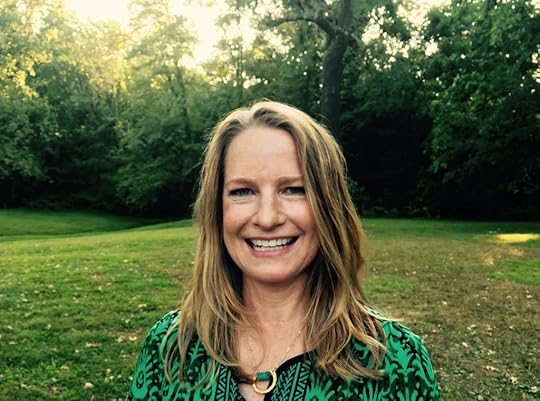
I write historical fiction. My family lived in Germany for two years when I was an impressionable middle-schooler. Whenever we found an English language bookshop, I bought as many used historical romances as my mother would allow. This early foray into the thrilling combination of history and fiction kicked off a lifelong passion for the genre. I’ve subsequently lived in Europe three more times, and each experience deepened my love of European history, its landscapes, and its cultures.
Are you an avid reader? Do you prefer books in your own genre or are you happy to explore others?I’ve been a voracious reader since I was a small child. As a kid I loved mysteries and fantasy series, but I also devoured nonfiction titles. Historical fiction continues to be my favorite genre, but I occasionally branch out into psychological thrillers, women’s fiction, science fiction, and Swedish crime mysteries.
Are you a self-published/traditional or hybrid author?I am an independently published author. That means I hire a team of professionals (cover designers, mapmakers, editors, and more) to help me produce and publish my fiction. I love working this way. It gives me a lot of flexibility and it challenges me by forcing me to wear lots of different hats.
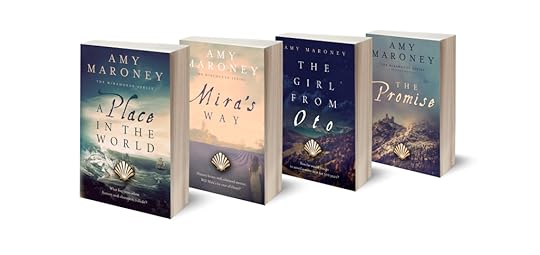 Who has been the biggest influence on your writing?
Who has been the biggest influence on your writing? All the authors of the books I’ve read over my lifetime. I’m a firm believer that reading makes a good writer. Absorbing and comparing different writing styles, whether it’s conscious or subconscious, forces me to think about what I could be doing better. I also was very lucky as a young person to have journalist parents whose love for reading and writing was passed on to me. They taught me a lot about good editing.
If you weren’t an author, what would you be up to?I’ve been drawing and painting for the past twenty years or so, but as my author career has taken off I’ve had to step back from art. I think if I wasn’t writing, I would be drawing and painting instead. I have a strong creative streak and I’m not happy if I’m not engaged in some kind of art practice.
If you could travel back in time, what era would you go to? What draws you to this particular time?My books focus on the late medieval/early Renaissance era in Europe (1450-1500). I find this a fascinating time in history. Europe is emerging from the devastation of the plague, the Renaissance is blossoming, the merchant class is making great strides, there’s an incredible maritime economy connecting all these vibrant societies, women still wield autonomy in powerful abbeys and convents. It’s all wonderful fodder for fiction.
Please tell us about your latest published work.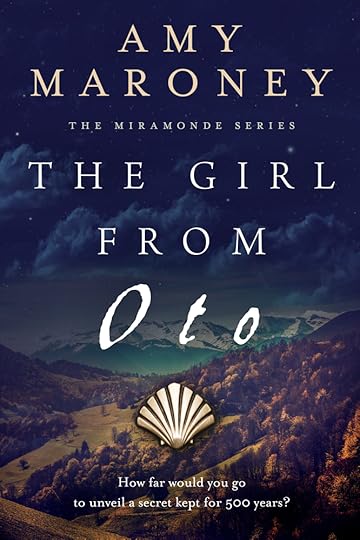
My Miramonde Series tells the story of a Renaissance-era woman artist and an American scholar linked by a 500-year-old mystery.
In Book 1, The Girl from Oto, the heroine of the series is born into a ruthless and violent noble family; her mother names her Miramonde, ‘one who sees the world.’ Raised in a convent, Mira becomes an extraordinary artist—never dreaming she will one day fulfill the promise of her name.
Mira’s modern-day counterpart, Zari Durrell, is a young American scholar doing research in Europe who discovers traces of a mysterious woman artist in several sixteenth-century paintings. Soon she’s tracing a path through history to Mira herself. But the art world ignores her findings, dazzled by a rival academic’s claim that the portraits were in fact made by a famous male artist.
Get The Promise, a free prequel novella to the Miramonde Series, and check out my blog here: https://www.amymaroney.com/. Or connect with me on Twitter, Instagram, Pinterest and Facebook.
The Girl from Oto can be purchased on all the major online platforms at: https://books2read.com/u/4ED9VA
February 27, 2021
A Conversation with Author Sharon Dempsey
 Sharon Dempsey
Sharon DempseyI’m a Belfast based crime writer. The first in my new crime series, ‘Who Took Eden Mulligan?’ was published in February by Avon Harper Collins. I am also a PhD researcher at Queen’s University, exploring class and gender in crime fiction.
Which genre do you write in and what draws you to it?SI work in the crime fiction genre. Crime fiction is above all else concerned with the study of human behaviour. When characters are placed in an extreme situation it is fascinating to see how they react. But at the same time as a writer of crime fiction I feel a responsibility to treat my characters justly and for my victim and their family to have space and room to explore their grief.
Are you an avid reader? Do you prefer books in your own genre or are you happy to explore others?I read everything. I would never limit myself to one genre though crime fiction is probably my go to comfort read. I have just finished The Last House on Needless Street by Caitriona Ward and it has totally blown me away. A strange gothic tale that pushes boundaries and creates new spaces metaphorically for the self. Truly hair raising, inventive and compelling.
Are you a self-published/traditional or hybrid author?Traditionally published.
Who has been the biggest influence on your writing?Probably crime writer Tana French. I love her murder squad series. Faithful Place was my favourite. Her latest book, The Searcher, is a wonderful novel that proves that literary fiction and genre fiction can go hand in hand.
Has your country of origin/culture influenced your writing?Yes, definitely. I grew up in Belfast during the Troubles and we are a society ripe with stories and now, post-conflict, is the time to tell them. I feel strongly that exploring society through a fictional lens is the best way to get to the emotional truth. But my work doesn’t always have the Troubles backdrop. My stories have universal themes. Northern Irish crime writing has really come into its own with writers like Claire Allan, Kelly Creighton, Brian McGilloway and Stuart Neville. I am proud to be part of that new wave of crime writers from here.
What part of the writing process do you find most difficult? How do you overcome it?I suppose the editing is my least favourite part. The first draft is often the most exciting part, where you are telling yourself the story and it’s fresh. I’m learning to appreciate the editing part too.
What was the best piece of writing advice you received when starting out?Whatever you are writing finish it! I think starting out we all have many unfinished projects. You can’t submit something until it is finished.
Do you have a favourite time of day to write?Usually mornings but I work at all hours. Pre lock down, I usually wrote during school hours, but I am always thinking about the story and will happily record notes on my phone or iPad at all times of the day and night. There is no switch off button when I’m writing.
If you weren’t an author, what would you be up to?I’d probably still be in journalism. As long as I’m writing, I’m happy.
If a movie was made of one of your books, who would you like to play the lead roles?Oh, good question! I think I need to give that some thought.
You have been chosen as a member of the crew on the first one-way flight to Mars – you are allowed to bring 5 books with you. What would they be?Gerald Durrell books Corfu books, My Family and Other Animals. Michael McLaverty’s Call My Brother Back (1939) describes the uprooting of 15 year old Colm MacNeill from Rathlin to a Belfast in the grip of the Troubles of the early 1920s. A Little Life by Hanya Yanagihara, Tender by Belinda McKeon, and Margaret Attwood’s Alias Grace. Sorry that’s six!
Please tell us about your latest published work. Who took Eden Mulligan? is a modern day murder investigation wrapped in a historical cold case.‘They’re dead. They’re all dead. It’s my fault. I killed them.’
Those are the words of Iona Gardener, who stands bloodied and staring as she confesses to the murder of four people in a run-down cottage outside of Belfast. Outside the cottage, five old dolls are hanging from a tree. Inside the cottage, the words “WHO TOOK EDEN MULLIGAN?” are graffitied on the wall, connecting the murder scene with the famous cold case of Eden Mulligan, a mother-of-five who went missing during The Troubles. But this case is different. Right from the start. Because no one in the community is willing to tell the truth, and the only thing DI Danny Stowe and forensic psychologist Rose Lainey can be certain of is that Iona Gardener’s confession is false …
If you would like to know more about Sharon and her books, please check out her links below:twitter @svjdempz
Facebook https://www.facebook.com/SharonDempsey13
Instagram sharondempseywrites
February 26, 2021
A Conversation with Author Hannah Byron
 Hannah Byron
Hannah ByronHannah Byron (penname of Hannah Ferguson) was born in 1956 in Paris, France. She is of British/Irish/Dutch descent and lives in The Netherlands. Next to writing historical fiction, she is a part-time translator for a Dutch university.
Which genre do you write in and what draws you to it?I’ve recently rebranded to historical fiction for the simple reason that I love history but I also think we can learn lessons from the part. That is, if humanity wasn’t so stubborn!
I wanted to try out my skills as an HF author with a backdrop that was intense and broad, a time that forced humanity to its knees, not once but twice. Hence the First and Second World Wars. I also wanted to set my novels in a time of budding feminism, a time when women started liberating themselves from apron strings and childbeds. Hence the 20th century.
Are you an avid reader? Do you prefer books in your own genre or are you happy to explore others?Yes, I always have 2 or 3 books on the go, 1 or 2 on my Kindle, 1 Audiobook for my hikes and usually a craft/marketing non-fiction for the business. I tend to read fiction in my own genre, yes but certainly not only about the world wars.
Are you a self-published/traditional or hybrid author?Proud Indie.
Who has been the biggest influence on your writing?I’m heavily influenced by the early Russian, European, and American masters … and by the stacks of Harlequin novellas I used to read. A cocktail of the absolute best with the quick and dirty is a favourite of mine.
Has your country of origin/culture influenced your writing?Since Covid and travel restrictions, yes. Before I was always focused on the UK and Ireland as my home base outside Holland, but these days I yearn for Paris where I was born. Most of my heroines at least have some connection to Paris. The book I’m currently writing is called The Parisian Spy … and well, you can guess where it’s situated.
What part of the writing process do you find most difficult? How do you overcome it?Depends, can be anything from starting a book after the plotting is done, to the middle part to keeping at it, to editing. I tend to be rather unsure and critical about my own work. At times, that can become counterproductive and make me slip into writer’s block for a while. I also find it hard with the current market to immediately embark on the next book when the previous one is done. As an Indie you have no choice but to produce more books as fast as you can.
What was the best piece of writing advice you received when starting out?Keep going, find your own voice, believe in yourself, don’t give up before you’ve written 1m words, stay in touch with other writers.
If you could live the life of an historical figure for one day, who would you choose and what would you get up to?I’d be my absolute hero Leo Tolstoy and learn to write as he could. And have a philosophical chat with him, of course.
Please tell us about your latest published work.My first book In Picardy’s Fields came out in September. People can read it for free if they join my newsletter.
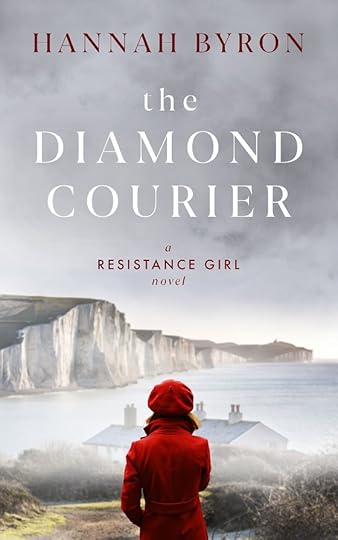
On 10 December my second book in The Resistance Girl Series called The Diamond Courier came out. Here’s the blurb:
England, 1940
A young rebel on a quest for independence finds herself squashed between Communist love, Jewish diamonds, and German greed.
Lili Hamilton cannot marry Iain Brodie, her best friend and her Tory father’s right hand at Betteshanger Colliery. Given the distance she sees between her parents, she will not, at nineteen, settle for domestic life. But her aspirations as a political journalist are thwarted when she is sent off to a finishing school in Switzerland in 1939.
On her way, she meets Leo Oppenheim in Paris. Not only is Leo the leader of the British Communist Party but also the prodigal son of London’s richest diamond merchant.
In a time of historical change, as World War II erupts, and after a mine strike causes a rift between her and her family and Iain, Lili moves to London, pursuing her Communist ideals and free love. But Leo needs money and has his eye on the largest diamond center in Europe: Antwerp.
Nazi Germany, too, is in dire need of Antwerp’s diamonds for its war machine.
On Leo’s command, Lili infiltrates the Jewish community in Belgium and befriends both the Goldmunz family and the Nazi leader. Despite the horrors of war, despite witnessing the murder of a comrade, she becomes the diamond courier between Antwerp and London via Vichy France.
Until she is caught in 1943 …
The Diamond Courier is a young woman’s fight to liberate herself from her privileged upbringing, for which she pays the highest price. Will she ultimately choose politics over love?
Social Media linksWebsite: https://hannahbyron.com
Newsletter signup: https://hannahbyron.com/HBNews
Facebook group: https://hannahbyron.com/HBrs
Facebook Author Page: https://hannahbyron.com/HBfb
Instagram: https://hannahbyron.com/HBin
BookBub: https://hannahbyron.com/HBbk
Pinterest: https://hannahbyron.com/HBpn
Linked In: https://hannahbyron.com/HBli
Twitter: https://twitter.com/HannahByron8
Book links:Links to Amazons for In Picardy’s Fields.
 Amazon US: http://hannahbyron.com/IPFam
Amazon US: http://hannahbyron.com/IPFam
 Amazon UK: http://hannahbyron.com/IPFuk
Amazon UK: http://hannahbyron.com/IPFuk
 Amazon CA: http://hannahbyron.com/IPCca
Amazon CA: http://hannahbyron.com/IPCca
 Amazon AU: http://hannahbyron.com/IPFau
Amazon AU: http://hannahbyron.com/IPFau
Links to Amazon The Diamond Courier
 Amazon US: https://hannahbyron.com/DCam
Amazon US: https://hannahbyron.com/DCam
 Amazon UK: https://hannahbyron.com/DCuk
Amazon UK: https://hannahbyron.com/DCuk
 Amazon CA: https://hannahbyron.com/DCca
Amazon CA: https://hannahbyron.com/DCca
 Amazon AU: https://hannahbyron.com/DCau
Amazon AU: https://hannahbyron.com/DCau
February 20, 2021
A Conversation with Penny Hampson
Today in the Library we have Penny Hampson, who has dropped in to say hello and to share some insights into her life as an author.
You are very welcome, Penny, please introduce yourself:Thank you for inviting me to your blog, Pam. It’s great to be able to chat. I’ll start by telling you a little about myself.
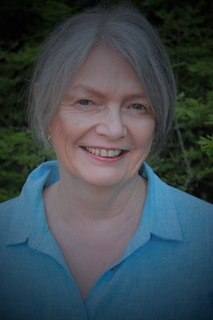 Penny Hampson
Penny HampsonI came to writing rather late in life, having spent most of my adult years bringing up my family and then working as researcher in an academic library. It was only when I made the difficult decision to give up working full time to enable me to care for a close family member that I decided to write my first novel. I’d been juggling both caring and work for ten years and it was beginning to get too much.
Of course, being a historian meant my first book was going to be an historical novel. I joined the New Writers’ Scheme of the Romantic Novelists’ Association, who were very helpful in critiquing my work and introducing me to other authors. A Gentleman’s Promise was eventually published in 2018. I’ve now written three historical novels, and one contemporary mystery/romance novel, with more to follow. I feel I’ve got a lot of catching up to do having started so late!
I live in Oxfordshire with my family, and when I’m not writing, I enjoy reading, walking, swimming, and the odd gin and tonic (not all at the same time).
Which genre do you write in and what draws you to it?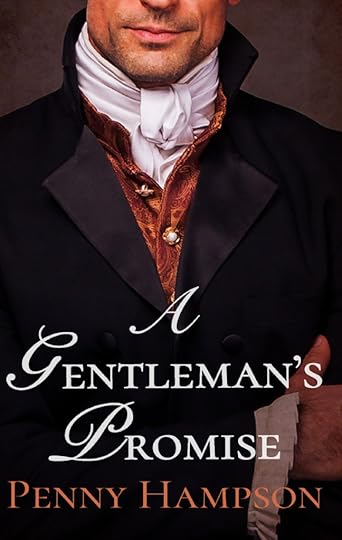
I write historical and contemporary. All my stories contain a mystery and a romance. I love books that have a happy ending, or certainly a happy for now. Life today is challenging for everyone, so I like to think my stories offer an escape from these difficult times, and because I’m passionate about history, even my contemporary stories have an historical element.
I started writing historical romances, because I’m a great fan of Georgette Heyer, and I wanted to capture the sense of time and place that she so cleverly manages in her stories.
Although I’ve branched out into contemporary stories, I’m still aiming for a sense of place with my locations, but now I can have female characters who are not hemmed in by historical social restrictions. I’ve also enjoyed introducing a paranormal element, which allows me to bring in some history, because where do ghosts come from? The past, of course!
Are you an avid reader? Do you prefer books in your own genre or are you happy to explore others?Yes, I love reading, though these days most of my reading is for research. I don’t get much time to indulge my leisure fiction reading, it usually consists of just half an hour before bedtime. I enjoy most genres, especially those with a mystery at the core, anything historical and preferably with a romance. With the change in my own writing direction, I’ve started reading more ‘dark’ fiction too, and enjoy Stephen King’s spooky stories.
Are you a self-published/traditional or hybrid author?I’m a hybrid author. My historical novels are all self-published, but The Unquiet Spirit, my first contemporary novel is with a publisher. It’s good having total control over one’s stories and how they look, but the costs of professional editing, proofing and covers are significant. These are costs which I consider to be essential before releasing my books.
Do you have a favourite time of day to write?My times for writing usually occur in the afternoons, though I have been known to carry on until the early hours if I’m on a roll and nothing more urgent (like meals,etc) needs to be done.
I share a rather cramped office with my husband, so it can get a little difficult at times, especially when I am trying to write a tense, emotional scene and he is swearing at his computer (we both do that!). However, the good news is that I have been promised a study of my own; our spare bedroom will, hopefully in the not too distant future, be transformed into a super-duper writer’s workspace, with room for all my research books, maps, and other bits and pieces.
If a movie was made of one of your books, who would you like to play the lead roles?I think that A Bachelor’s Pledge would make a good film, it has intrigue, adventure and romance, not to mention some fantastic locations set as it is in Cornwall and Bath. I can imagine James Norton as moody Phil Cullen and Maisie Williams as a determined Sophia Turner. Keeley Hawes would be fabulous as the scheming Ruth Newbody.
If you could live the life of an historical figure for one day, who would you choose and what would you get up to?What an intriguing question. I think if I was going to live the life of an historical figure for a day, I’d choose someone like Jane Austen. I’d love to be able to see inside her head and observe the world through her eyes. I love the pithy descriptions of characters that she does. She had a warm relationship with her sister, so I think that would be nice to experience. As someone who doesn’t have a sister I’d love to be able to share my thoughts with another female like Jane does with Cassandra. I’ve often wondered if the relationship between Lizzie Bennett and her sister Jane was based on Austen’s own experience. It would also be interesting to discover who she based the character of Mr Collins on!
Please tell us about your latest published work. .Set in 1810, A Bachelor’s Pledge tells the story of Phil Cullen, a secret agent and Sophia Turner, an orphan he rescues from a house of ill-repute.
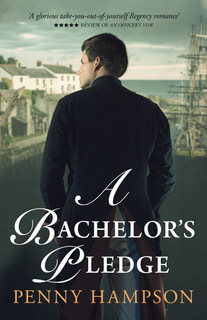
Secret agent Phil Cullen is upset when he discovers that the young woman he rescued from Mrs Newbody’s establishment has absconded from his housekeeper’s care without a word. Thinking he has been deceived, he resolves to forget about her… something easier said than done.
Sophia Turner is horrified when she is duped into entering a notorious house of ill-repute. Then a handsome stranger comes to her aid. Desperate that no one learns of this scandalous episode, Sophia flees to the one friend she knows she can trust. With luck, she will never see her mysterious rescuer again.
Months later, Phil is on the trail of an elusive French agent and Sophia is a respectable lady’s companion when fate again intervenes, taking their lives on a collision course.
Traitors, spies, and shameful family secrets – will these bring Sophia and Phil together… or drive them apart?
Thanks again for having me as a guest on you blog, Pam. It’s been lovely chatting to you.
My pleasure, Penny.
***
If you’d like to know more about Penny and her work, check out her links below:Links:
Blog: https://pennyhampson.co.uk/blog/
Twitter: https://twitter.com/penny_hampson
Facebook Author Page: www.facebook.com/pennyhampsonauthor
Facebook Personal Page: https://www.facebook.com/pennyhampsonwriter
Goodreads: https://www.goodreads.com/Penny_Hampson
Amazon Author Page (UK): https://www.amazon.co.uk/Penny-Hampson/
Amazon Author Page (US): amazon.com/author/pennyhampson
February 17, 2021
New Release from Sharon Dempsey
 Sharon Dempsey
Sharon DempseyHappy Publication Day, Sharon!
Today I am delighted to share details of this fabulous new release from Belfast based crime writer, Sharon Dempsey. Who Took Eden Mulligan? is the first in her new crime series and is published by Avon Harper Collins. When not writing, Sharon is a PhD researcher at Queens, exploring class and gender in crime fiction.
Who took Eden Mulligan? is a modern day murder investigation wrapped in a historical cold case.
‘They’re dead. They’re all dead. It’s my fault. I killed them.’Those are the words of Iona Gardener, who stands bloodied and staring as she confesses to the murder of four people in a run-down cottage outside of Belfast.
Outside the cottage, five old dolls are hanging from a tree. Inside the cottage, the words “WHO TOOK EDEN MULLIGAN?” are graffitied on the wall, connecting the murder scene with the famous cold case of Eden Mulligan, a mother-of-five who went missing during The Troubles.
But this case is different. Right from the start.
Because no one in the community is willing to tell the truth, and the only thing DI Danny Stowe and forensic psychologist Rose Lainey can be certain of is that Iona Gardener’s confession is false …
A creepy, gritty and very compelling crime novel, perfect for fans of Patricia Gibney, Angela Marsons and Jane Casey.
Buy LinkWatch out for next week’s interview with Sharon when she will share insights into her writing life.
February 12, 2021
A Conversation with Author Vivienne Brereton
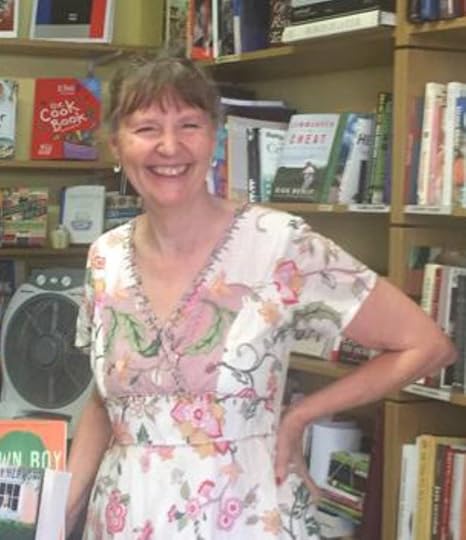 Vivienne Brereton
Vivienne BreretonThank you so much, Pam, for inviting me to the Library. I’d like to start off by telling you a little about myself.
Born between historic Winchester and Southampton in the UK, I have been passionate about the Tudors for as long as I can remember. This led to a degree in Medieval History at university, and the growing desire to write a novel.
However, life took over somewhat and only after stays, short and long, in six countries I called home did I finally settle down to finish my novel.
Words have always played an important part in my life, whether it’s been writing, editing, teaching English, or just picking up a good book.
Seeing A Phoenix Rising, the first book in the series The House of the Red Duke in print for the first time was a moment of great joy for me. I hope anyone reading it will enjoy the end result as much as I enjoyed writing it.
Having three sons came in very handy when I had to write about squabbles between the male characters in my novel. Not so handy when I took my boys to Hampton Court and one of them got lost in the maze!
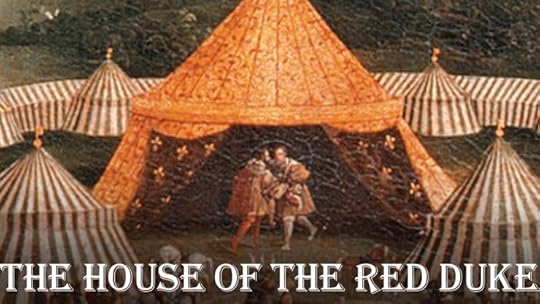 Who has been the biggest influence on your writing?
Who has been the biggest influence on your writing?I think that has to be Anya Seton. I started off reading Jean Plaidy novels but then discovered Anya’s Katherine and was in awe of her attention to detail and the way she sweeps the reader along, pulling them back into another time and place. What is all the more remarkable was that she was writing long before the days of finding all the facts at your fingertips. My favourite is Green Darkness, a tale of reincarnation that spans the centuries.
Has your country of origin/culture influenced your writing? Thomas Howard
Thomas HowardThat’s a very interesting question, Pam. Writing about the Tudors obviously took me to castles and stately homes all over England. I was lucky enough to do some of the research in the British Library in London. However, I’ve lived in the South of France for twenty years now so I did a lot of research here too for the ‘French’ part of my book. The series I’m writing has several points of view and the action takes place in four European courts: England, Scotland, France, and what was the Burgundian Netherlands. I feel very fortunate to open my front door onto history in a village that was founded in 1519 by François I.
What was the best piece of writing advice you received when starting out?Just write. Write every day, no matter what it is. If you do that, you get into a habit of writing that becomes second nature.
Do you have a favourite time of day to write?No. I think I’m quite lucky in that I can write at any time day or night. I’m a bit of a night owl so that suits me.
If you could travel back in time, what era would you go to? What draws you to this particular time?
It has to be the early Tudor court of Henry VIII. I would love to go back to the 1520 Field of Cloth of Gold that took place just outside Calais, the one remaining piece of English territory in France. Six thousand members of the English court travelled across the Narrow Sea to meet up with an equal number from the French one. It was the most exciting event of the sixteenth century and even now, the entertainment sounds almost beyond the realms of the imagination. It was three weeks of feasting, jousting, dancing, listening to music, competing at sports and an all round excuse to show off right royally. I would want to rock up to witness the wrestling match between Henry and François, on which the English records are strangely silent, probably because François expertly threw the proud English king to the ground with a move that came from Breton wrestlers. Let’s just say Henry was not amused, especially when François refused a re-match.
Please tell us about your published work.The second book in the series comes out on Saint Valentine’s Day which seemed very apt as one of the characters is called Valentine. Book One: A Phoenix Rising centres on Thomas Howard (grandfather of two of Henry’s queens), a remarkable man who lived to the ripe old age of eighty. As the charismatic head of the powerful Howards, he managed to weather the reigns of six kings. In the first book, we discover that the Howards made a disastrous tactical mistake by supporting King Richard III at the Battle of Bosworth.
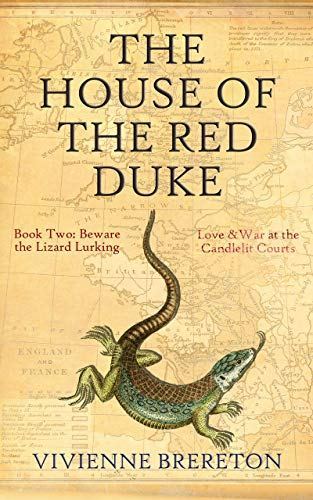
In the novel, Thomas travels to Cornwall, Scotland and France where we meet four young people who are linked to one another like the threads of a tapestry.
Beware the Lizard Lurking continues the story and is again about power, ambition and love. Thomas is a keeper of secrets but there are no secrets that time does not reveal …
Amazon links:
Twitter @VivienneBreret1
Website www.viviennebrereton.com
February 9, 2021
#DoubleMirrorTour with Alison Morton and Helen Hollick
Here’s a treat! Two of my favourite authors, Alison Morton and Helen Hollick, are on a book blog tour together and I’m delighted to be hosting them today. Not only are the ladies sharing their fabulous covers and blurbs, they are giving us exclusive extracts from both books.
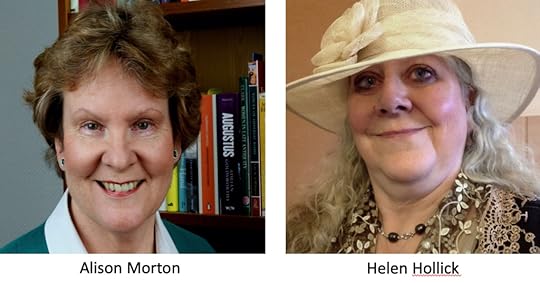 ALISON MORTON – DOUBLE IDENTITY
ALISON MORTON – DOUBLE IDENTITYDeeply in love, a chic Parisian lifestyle before her. Now she’s facing prison for murder.
It’s three days since Mel des Pittones threw in her job as an intelligence analyst with the French special forces to marry financial trader Gérard Rohlbert. But her dream turns to nightmare when she wakes to find him dead in bed beside her.
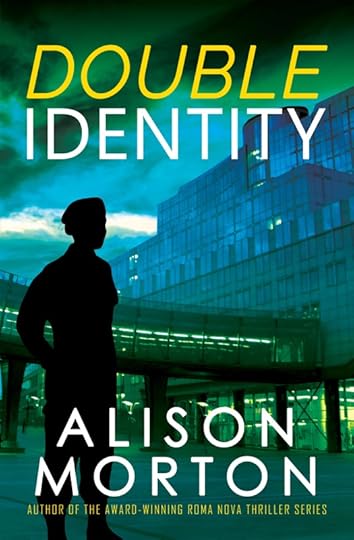
Her horror deepens when she’s accused of his murder. Met Police detective Jeff McCracken wants to pin Gérard’s death on her. Mel must track down the real killer, even if that means being forced to work with the obnoxious McCracken.
But as she unpicks her fiancé’s past, she discovers his shocking secret life. To get to the truth, she has to go undercover and finds almost everybody around her is hiding a second self. Mel can trust nobody. Can she uncover the real killer before they stop her?
A stunning new thriller from the author of the award-winning Roma Nova series, fans of Daniel Silva, Stella Rimington and Chris Pavone will love Double Identity .
EXCERPT FROM DOUBLE IDENTITYMel shivered. A cold breeze drifted over her bare backside. Dieu, the window must be open. Stupid in late November in London. But windows had been the last things on Mel’s mind last night.
Still drugged with sleep, she stretched out her hand towards Gérard’s face. His eyes were closed, the lashes resting on his pale cheeks. Too much time indoors, Mel thought and smiled. In his early morning relaxed state, Gérard looked more like a boy of seventeen than a man of thirty-seven.
Her eyelids were so heavy. She closed them. After a few seconds, she realised she wasn’t tired, just thick-headed. Opening her eyes again, she blinked hard then tugged on the duvet to cover them both against the too fresh air, but it was trapped under Gérard’s body. Never mind, she could think of a much more pleasurable way to warm up than hiding under the bedclothes. She stroked his skin with the tips of her fingers sliding over the fine brown hairs on his shoulder, then down his chest and over his stomach towards…
He didn’t stir.
He was cold. Stone cold.
No.
Then the smell hit her.
She sat up. The world spun around her. She shot her hand out onto the mattress to steady herself, then knelt beside him. Not wanting to, but knowing she had to, she stretched out her hand, two fingers close together, for the side of his throat. Nothing. She pressed harder, desperate for a sign. But he was too still and too pale. And the blue lips…
Dieu, no. Not her Gérard. Not clever, witty, vibrant Gérard. He couldn’t be gone. But she’d confirmed enough dead bodies during her military life, the last only three weeks ago in a blazing desert wadi in Africa. She sat back, shivered and pressed the palms of her hands into her eye sockets. The sourness ran up her gullet. Clamping her hand over her mouth, she stumbled to the bathroom and threw up in the pan.
***
Ambulance. She must call an ambulance.
***
She sat on the toilet seat and gulped down water from the plastic tooth mug. In the bedroom, the green-uniformed man and woman were examining Gérard. Through the gap of the almost closed door, Mel could hear them mumbling to each other. After a few minutes, they stopped talking. They were making a call, giving the hotel name.
The woman came into the bathroom. Her calm face didn’t seem as sympathetic as it had been earlier.
‘What is it?’ Mel asked.
‘We’ve had to call the police. We’ve found something and there are marks on the deceased’s body.’
‘What? Let me see!’ Mel said and leapt up.
The woman held out her plastic-gloved hand.
‘No, stay here, and don’t wash. The police will want to talk to you.’
***
‘What sort of a name is Mellysand?’
She clutched the bathrobe tighter and braced her legs to steady her balance. This was surreal. Gérard was dead and they suspected her. Why? How was she supposed to have done it? She shook her head which seemed full of mush thumping to escape.
‘It’s pronounced “Mél-i-send-uh”,’ she said. ‘And it’s the name I was given by my parents.’
‘Not very English, is it?’
Le bon Dieu save me from these parochial Brits, she thought. And this cop was even worse than most. He didn’t look like one either in his jeans, tan leather jacket, unshaven and with a single earring. But his warrant card looked genuine, and the two uniformed police outside had let him in.
‘You got any ID?’ he barked.
Mel pulled a pale turquoise and blue card with her photo and signature out of her purse and offered it to him.
‘French?’ He frowned, flicked it over to the other side, then back. ‘You don’t sound very French.’
‘That’s where I was born. My mother is English.’
‘What are you doing here?’
‘Visiting friends and doing some shopping.’
‘I’ll need a list of those friends and dates.’
‘Why? Am I under suspicion?’
The cop looked down at the bed, duvet pulled back, bottom sheet stained by body fluids.
‘When there’s a dead man in your bed and you were presumably the last person to see him alive, let’s say you’re at least a person of interest.’
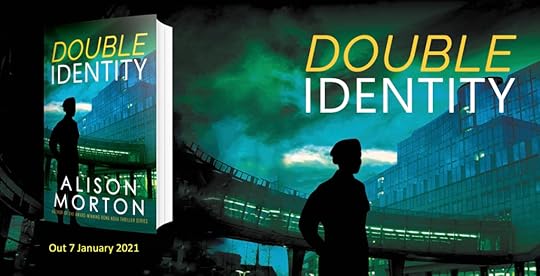
BUYING LINKS
Kindle:
https://mybook.to/DoubleIdentity
(ASIN: B08P5YD3CN)
For all ebook and paperback retailers: https://bit.ly/3s0XUlV
HELEN HOLLICK – A MIRROR MURDERThe first in a new series of cosy mysteries set in the 1970s… Will romance blossom between library assistant Jan Christopher and DC Laurie Walker – or will a brutal murder intervene?
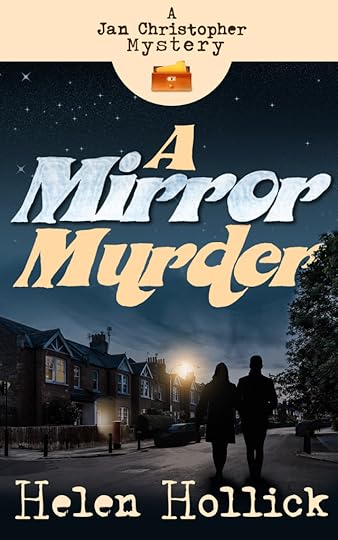
Eighteen-year-old library assistant Jan Christopher’s life is to change on a rainy Friday evening in July 1971, when her legal guardian and uncle, DCI Toby Christopher, gives her a lift home after work. Driving the car, is her uncle’s new Detective Constable, Laurie Walker – and it is love at first sight for the young couple.
But romance is soon to take a back seat when a baby boy is taken from his pram, a naked man is scaring young ladies in nearby Epping Forest, and an elderly lady is found, brutally murdered…
Are the events related? How will they affect the staff and public of the local library where Jan works – and will a blossoming romance survive a police investigation into murder?
EXCERPT FROM CHAPTER EIGHTEEN…I dragged myself into work on Monday. Bad enough starting a long week after what seemed a weekend of deprived sleep. I felt like death warmed up. A phrase which, as soon as it entered my head I regretted. By the time I’d stepped off the bus and hurried down Hall Lane, my throat was tight and my stomach was churning. Everyone would be asking me questions; questions I didn’t want to answer because these would belong to gossip and sensationalism, not the ‘helping with enquiries’ police kind. And then my work colleagues would be wanting to know the extra, gory, details let slip by my uncle. It would be no use insisting that he never let details slip – gory or otherwise. At the thought of it all, I wasn’t sure whether I wanted to cry or vomit. Admonishing myself to pull myself together, I breathed in a few lungfuls of air, and instantly regretted it as a lorry thundered past, spewing clouds of obnoxious exhaust fumes in my direction. So much for fresh air.
I squared my shoulders and raised my head – good deportment, Aunt Madge would have said, had she been there to approve – and walked with a brisk step towards the gate to the side entrance of the library. In through the open back door. I glanced at the clock in the staff room as I hung my coat up and shoved my packed lunch of cold beef sandwiches into the refrigerator. Five minutes past nine. I was late. Smoothing my skirt, short but not so short as to receive a frown from the head librarian, Mr Hurst, or a telling-off from his deputy, Miss Pamela Bower, both of whom, I swear, still thought that women should wear Victorian-length dresses. I smiled as I slid behind the U-shaped counter and thrust my handbag onto the bottom shelf. To my relief, Mr Hurst and Miss Bower were in the office. (To be fair, we did usually call her Pamela, but I would never have dreamed of calling Mr Hurst anything else; in fact, I didn’t know his Christian name.)
The door was open, but even closed I would have heard most of what Mr Hurst was ranting on about because his voice was raised to parade ground altitude. He was shouting about being harangued by the police on a Sunday – a Sunday (his emphasis, not mine), regarding nuisance old biddies stealing – stealing – coupons from our – our – newspapers! I listened for a few minutes, one ear cocked.
“And then!” His voice was rising to a shriller indignation, “And then, the impertinent young policeman actually said – actually said – was I angry about the cut-out coupons because I wanted them! The nerve of it! To suggest that I need a shilling’s worth of food coupons!”
I grinned at Pamela’s reply.
“Don’t you mean five new pence, Mr Hurst? We went decimal back in February.”
I’m surprised he didn’t apoplectically explode, but he probably wasn’t listening to her. He rarely listened to anyone.
“If the woman was not, most conveniently, dead, I would have her arrested for theft!”
Miserable basket, I thought.
“Come to that, if I had caught her defacing our property – yes, Miss Bower, defacing our property, I would have considered killing her myself!”
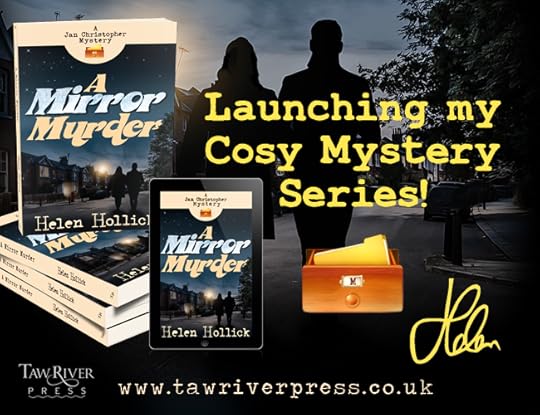
BUYING LINK:
Amazon Author Page (Universal Link) http://viewauthor.at/HelenHollick
ABOUT ALISONAlison Morton writes award-winning thrillers series featuring tough, but compassionate heroines. She blends her deep love of France with six years’ military service and a life of reading crime, historical, adventure and thriller fiction. On the way, she collected a BA in modern languages and an MA in history.
“Grips like a vice – a writer to watch out for” says crime thriller writer Adrian Magson about Roma Nova series starter INCEPTIO. All six full-length Roma Nova thrillers have won the BRAG Medallion, the prestigious award for indie fiction. SUCCESSIO, AURELIA and INSURRECTIO were selected as Historical Novel Society’s Indie Editor’s Choices. AURELIA was a finalist in the 2016 HNS Indie Award. The Bookseller selected SUCCESSIO as Editor’s Choice in its inaugural indie review.
Alison now lives in Poitou in France, where part of Double Identity is set and is writing a sequel as well as continuing her Roma Nova series.
Connect with Alison on her thriller site: https://alison-morton.com
Facebook author page: https://www.facebook.com/AlisonMortonAuthor
Twitter: https://twitter.com/alison_morton @alison_morton
Newsletter sign-up: http://eepurl.com/ckNeFL
ABOUT HELENHelen and her family moved from north-east London in January 2013 after finding an eighteenth-century North Devon farmhouse through BBC TV’s popular Escape To The Country show.
First accepted for publication by William Heinemann in 1993 – a week after her fortieth birthday – Helen then became a USA Today Bestseller with her historical novel, The Forever Queen (titled A Hollow Crown in the UK) with the sequel, Harold the King (US: I Am The Chosen King) being novels that explore the events that led to the Battle of Hastings in 1066. Her Pendragon’s Banner Trilogy is a fifth-century version of the Arthurian legend, and she also writes a pirate-based nautical adventure/fantasy series, The Sea Witch Voyages.
Her non-fiction books are Pirates: Truth and Talesand Life of A Smuggler. She also runs Discovering Diamonds, a review blog for historical fiction. She is currently writing more Voyages for the Sea Witch series and the next in the Jan Christopher Mysteries series. She has other ideas for other tales – and would like the time to write them!
CONNECT WITH HELEN:
Website: www.helenhollick.net
Newsletter Subscription: http://tinyletter.com/HelenHollick
Facebook: www.facebook.com/HelenHollickAuthor
Twitter: @HelenHollick
Discovering Diamonds Historical Fiction Review Blog :
Ladies, thanks so much for dropping by. I have to admit both books sound right up my street.January 4, 2021
A Conversation with Author Elizabeth Keysian
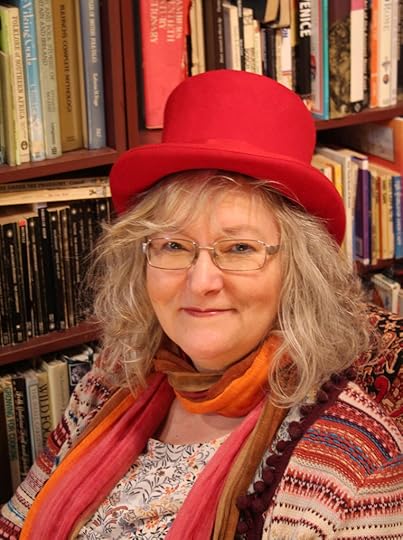
Elizabeth Keysian is an international bestselling author of heart-pounding Regency romances, set mostly in the West of England. She is working on a fresh series for Dragonblade Publishing called Trysts and Treachery, which is set in the Tudor era. Though primarily a writer of romance, she loves to put a bit of mystery, adventure, and suspense into her stories, and refuses to let her characters take themselves too seriously.
Elizabeth likes to write from experience, not easy when her works range from the medieval to the Victorian eras. However, her passion for re-enactment has helped, as have the many years she spent working in museums and British archaeology. If you find some detail in her work you’ve never come across before, you can bet she either dug it up, quite literally, or found it on a museum shelf.
Which genre do you write in and what draws you to it?
I write historical fiction, essentially romances, from the High Medieval to the Victorian era, all set in England. I knew when I decided to write, it had to be romance, because I’ve always been a terrible one for getting crushes on people (I’ve grown up now, I promise!). My stories had to be historical too, because that’s what I studied, and I’ve worked in history and heritage for most of my career, so I guess that suggests I like the subject. Although I don’t write romantic comedy, I have always tried to make people chuckle, so some of my stories include moments when the characters do ridiculous things. And occasionally a reader will find funny something I never meant them to, but that’s all part of the magic of imagination.
Has your country of origin/culture influenced your writing?
It most certainly has. Ever since I was young, I’ve been fascinated by British history, and loved going to castles, museums and archaeological sites. I then developed a fascination with folk traditions, folk medicine and folksong—I was even a singer in a folk band for a little while. But it wasn’t enough to be interested in the past; I wanted to LIVE it. So, having learned a bit about the English Civil War at school, I joined the Sealed Knot and had fun not only recreating Seventeenth Century battles, but also learning the language, the songs, the music and the dances of those times.
Then I became even braver, and took on the role of a Tudor person at Kentwell Hall in Suffolk, which is like live action role play, only in front of visiting schoolchildren, so you have to work really hard at being authentic in order to be convincing. It was fabulous being able to do everyday activities the same way Tudor folk used to do them; I loved cooking up feasts and simple fare, making costume, making cheese, processing and spinning wool, shooting my own longbow, performing a masque and mixing up medicines. And, of course, there was sword fighting, music, singing and dancing as well. And drinking. Just a little bit of drinking. But I swear to you, what you miss most when being a Tudor for 8-9 hours a day is a good old British cup of tea. Not permitted in front of the visitors, because of course, tea wasn’t being drunk in England in the Tudor period, nor coffee, and we had no potatoes, or tomatoes, or tobacco.
What was the best piece of writing advice you received when starting out?
That’s surprisingly easy to answer. I was working with a museum curator who wanted to be a scriptwriter. His advice was not to spend ages agonising over your work, but to just get it down on paper, even if you thought you were writing rubbish. He felt that editing as you go slowed down the creative process too much, and I find I agree. But if you are going to write like that, and get the story down before you edit, it’s a good idea to have planned everything meticulously in advance.
If you weren’t an author, what would you be up to?
Well, I’m too plagued by chronic illnesses to return to work, sadly, so if I wasn’t writing, I’d be pursuing my hobbies. I have a lot of family history research to do; admittedly, being able to get back as far as a Scandinavian royal family that traces its origins back to Odin is quite impressive. However, some more recent ancestors are proving most elusive, so I’d love to fill in the gaps in the family tree.
I also have many craft activities I have always been meaning to get around to, only I never have the time. I am so naughty—I buy kits to make things and then never do. I should be making lace, weaving a little basket, making a corn dolly and enamelling copper jewellery made by my father to make it more appealing to modern tastes. I also need to get on with my bookbinding; I have several antiquarian books I bought as “projects” and I still have all the kit. So, I guess you could say if I took time out from writing, I’d be a lady of (creative) leisure.
Please tell us about your latest published work.
When you’re an archaeologist, you’re never far away from the material culture of your ancestors. So, I was influenced by this, and the fact I spent 7 years living on a former Knights Templar site in Essex called Cressing Temple. It was essentially a massive farm back in the medieval period, raising crops to sell and fund the Knights when they went on crusade. The two early thirteenth century barns built by the Templars remain to this day. I was very much influenced by all I learned and experienced on that site, and have used it to provide a context for my current Tudor romance, LORD OF MISTRUST, which is set in the 1550s, after the Temple had ceased to be a religious site.
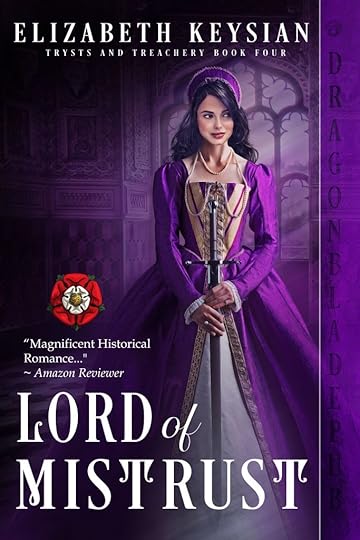
Following their hearts could destroy the monarchy
Headstrong Chloe dresses as a boy and runs away to her birth mother to escape a horrendous marriage. She’s shocked to discover that her parent owns a bawdy house, and is in no position to help – nor will she reveal the identity of Chloe’s father. When a street accident throws Chloe into the lap of the tempting Robert Mallory, he offers distraction and adventure, but his stubborn refusal to trust her endangers them both.
Hot-headed Robert Mallory is battling to protect his sister, his livelihood, and his honor. He’s a spy who can’t follow the rules and distrusts everyone, particularly the delectable young woman from the bordello. Having endangered her, then rescued her from a nest of traitors, he learns that Chloe is the natural daughter of the one man he can’t afford to upset, Sir Mortimer Fowler. Offering marriage to save Chloe’s reputation is out of the question, as Fowler needs her for bait in a deadly trap.
Robert is faced with an impossible choice. He’s desperate to save Chloe, but if he follows his heart, the security of the entire realm is at risk.
Buy Link: http://mybook.to/mistrust
If you would like to know more about Elizabeth and her work, please check out her links below:
Newsletter sign-up: http://eepurl.com/cxe369
Amazon page: https://www.amazon.com/Elizabeth-Keysian/e/B06VVL9JMB/ref=dp_byline_cont_ebooks_1
Facebook: https://www.facebook.com/LizKeysian/
BookBub: https://www.bookbub.com/profile/elizabeth-keysian
Website: https://elizabethkeysian.com/
December 28, 2020
Golden Squirrel 2020 Indie Book Awards
Footprints in the Sand wins a silver medal for best mystery in the Book Squirrel 2020 Awards
Book Squirrel announced the third annual Golden Squirrel Independent Book Awards on December 28th, 2020.
These are the books or series that Book Squirrel has deemed the best in their genre from those read and reviewed on this blog in 2020.
This is not a voting or popularity contest. It’s entirely subjective, based on Book Squirrel’s excellent taste.Book Squirrel has been as fair and impartial as a squirrel can be in awarding the winners witha2020Golden Squirrel Gold or Silver Award.
There is a Gold and Silver award given by genre, and an award for Book of the Year.
Best Children’s Books
Ronaldo and the Flying Reindeer Academy by Maxine Sylvester
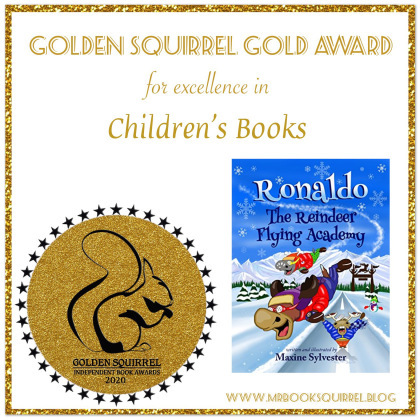
Lucy Evans Instaexplorer: Dragons Rock by Millie Slavidou
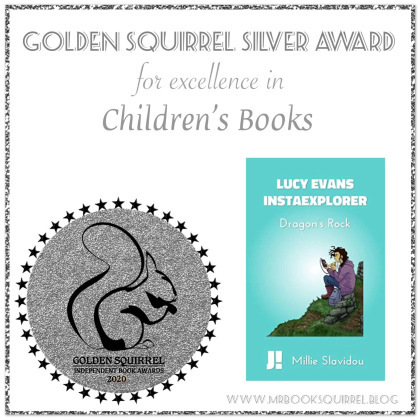
Best YA Fantasy
Mya by Missy Sheldrake
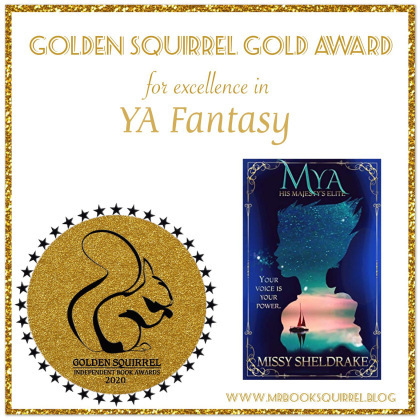
Miss Mabel’s School for Girls by Katie Cross
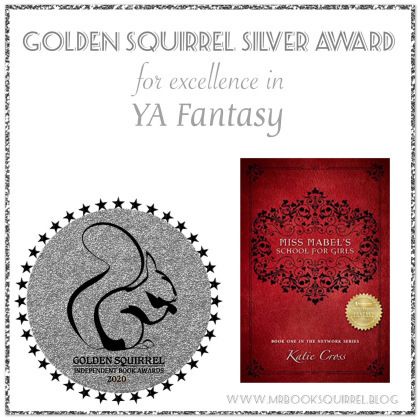
Best YA…
View original post 436 more words






